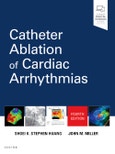From anatomy and diagnostic criteria through specific mapping and ablation techniques, Catheter Ablation of Cardiac Arrhythmias, 4th Edition, covers all you need to know in this fast-changing field. Ideal for practitioners who need a comprehensive, user-friendly ablation text for the electrophysiology lab or office setting, this authoritative reference offers quick access to practical content, using dynamic videos, detailed tables, and high-quality images to help you apply what you learn in your practice.
- Incorporates recent, exciting developments in the field, including new mapping, imaging, and catheter technologies and ablation techniques.
- Contains new chapters on Pulmonary Vein Isolation by a Cryoballoon Catheter; Substrate-Based Ablation for Ventricular Tachycardia; and Ablation of Genetically Triggered Ventricular Tachycardia/Fibrillation.
- Offers new and expanded coverage of difficult cases VT ablation, including VT storm and use of hemodynamic support during ablation; new techniques for ablation of persistent and long-lasting persistent atrial fibrillation; cryoballoon-based pulmonary vein isolation to treat atrial fibrillation; and more.
- Offers expert guidance on atrial tachycardia and flutter, atrial fibrillation, atrioventricular nodal reentrant tachycardia, tachycardias related to accessory atrioventricular connections, ventricular tachycardia, transseptal catheterization techniques, ablation for pediatric patients, and patient safety and complications.
- Helps you master each approach with exceptional visual guidance from nearly 300 new illustrations and figures, including many new ECGs, intracardiac recordings, as well as 3D mapping, ultrasound and fluoroscopic images.
- Includes numerous tables that provide quick access to key points, arrhythmia mechanisms, diagnostic criteria, target sites for ablation, use of special equipment, complications, and troubleshooting problems and their solutions.
- Provides access to 45 video clips (18 are new!) including newer techniques for transseptal access to the left atrium, expanded use of intracardiac ultrasound, techniques of pericardial access, and many more.
- Enhanced eBook version included with purchase. Your enhanced eBook allows you to access all of the text, figures, and references from the book on a variety of devices.
Table of Contents
CATHETER ABLATION OF CARDIAC ARRHYTHMIAS
4TH EDITION
TABLE OF CONTENTS
PART 1: FUNDAMENTAL CONCEPTS OF TRANS-CATHETER ENERGY DELIVERY
1. Biophysics and Pathophysiology of Radiofrequency Lesion Formation
2. Guiding Lesion Formation During Radiofrequency Energy Catheter Ablation
3. Irrigated Radiofrequency Catheter Ablation
4. Catheter Cryoablation: Biophysics and Clinical Applications
5. Cardiac Anatomy for Catheter Mapping and Ablation of Arrhythmias
PART 2: CARDIAC MAPPING AND IMAGING
6. Fundamentals of Intracardiac Mapping
7. Catheter Three-Dimensional Mapping Systems
8. Remote Catheter Navigation Systems
9. Intracardiac Echocardiography, Computed Cardiac Tomography, and Magnetic Resonance Imaging for Guiding Mapping and Ablation
PART 3: CATHETER ABLATION OF ATRIAL TACHYCARDIAS AND FLUTTER
10. Ablation of Focal Atrial Tachycardias
11. Ablation of Cavo-Tricuspid Isthmus-Dependent Atrial Flutter
12. Ablation of Nonisthmus-Dependent Flutters and Atrial Macroreentry
13. Ablation of Postoperative Atrial Tachycardia in Congenital Heart Disease
PART 4: CATHETER ABLATION OF ATRIAL FIBRILLATION
14. Pulmonary Vein Isolation for Atrial Fibrillation
15. Pulmonary Vein Isolation by a Cryoballoon Catheter
16. Ablation of Non-Pulmonary Vein Triggers
17. Substrate-Based Ablation for Atrial Fibrillation
18. Ablation of AF Drivers: Focal Impulse and Rotor Modulation (FIRM)
19. Ablation of Persistent and Long-Lasting Persistent Atrial Fibrillation
20. Epicardial and Endocardial Hybrid Ablation for Atrial Fibrillation
PART 5: CATHETER ABLATION OF ATRIOVENTRICULAR NODAL REENTRY TACHYCARDIA AND THE ATRIOVENTRICULAR JUNCTION
21. Ablation of Atrioventricular Junctional Tachycardias: Atrioventricular Nodal Reentry, Variants, and Focal Junctional Tachycardia
22. Atrioventricular Junction Ablation for Heart-Rate Control of Atrial Fibrillation
PART 6: CATHETER ABLATION OF ACCESSORY ATRIOVENTRICULAR CONNECTIONS
23. Ablation of Free-Wall Accessory Pathways
24. Ablation of Posteroseptal Accessory Pathways
25. Ablation of Superoparaseptal and Midseptal Accessory Pathways
26. Ablation of Atriofascicular Accessory Pathways and Variants
27. Special Problems in Ablation of Accessory Pathways
PART 7: CATHETER ABLATION OF VENTRICULAR TACHYCARDIA
28. Ablation of Ventricular Outflow Tract Tachycardias
29. Ablation of Idiopathic Left and Right Ventricular and Fascicular Tachycardias
30. Ablation of Ventricular Tachycardia in Coronary Artery Disease
31. Ablation of Ventricular Tachycardia Associated with Nonischemic Cardiomyopathy
32. Ablation of Unstable Ventricular Tachycardia and Idiopathic Ventricular Fibrillation
33. Substrate-Based Ablation for Ventricular Tachycardia
34. Epicardial Approach to Catheter Ablation of Ventricular Tachycardia
35. Ablation of Ventricular Tachycardia with Congenital Heart Disease
36. Ablation of Genetically Triggered Ventricular Tachycardia
37. Ablation of Ventricular Tachycardia with Percutaneous Hemodynamic Support
PART 8: MISCELLANEOUS TOPICS
38. Complications Associated with Radiofrequency Catheter Ablation of Arrhythmias
39. Atrial Transseptal Catheterization
40. Special Considerations for Ablation in Pediatric Patients








